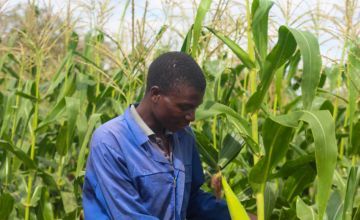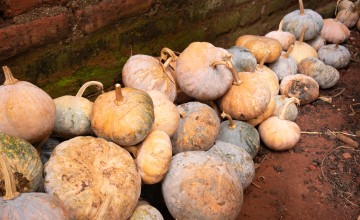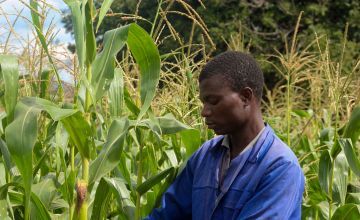
Read our 2024 annual report

Knowledge Hub
Encouraging winter-cropping is a key component of Concern's work in Malawi.
Gift Kachipande from Mfungo, Neno District, spoke to us recently and summed up the impact that winter-cropping has made to his family.
“Adopting a winter-cropping approach has increased my family’s food security and financial stability. Every year the erratic rainfall affects our crop," Gift told us.
"This previously led to food shortages. With winter-cropping we have two harvests each year, which feeds my family and has created a sustainable source of income from the sale of our excess crops.”
Traditionally, the majority of Malawian farmers sow their crops at the start of the summer rainy season (normally the end of November or early December) and harvest them at the start of the winter dry season in April and May. 85% of Malawians are subsistent farmers, who grow the majority of their own food using rain to water their crops.
However, rising global temperatures are causing unpredictable shifts in Malawian weather patterns, and rainfall has become unreliable, with floods and dry spells becoming more common.

Growing a second harvest
Rain arrived late this year (in mid-January) and was shorter and heavier than normal.
The south of Malawi was hit by two significant cyclones in January and March, which killed more than 50 people, displaced more than 200,000 people and destroyed thousands of acres of crops. It is estimated that this year’s maize yield (the staple food for most Malawians) is between 30% and 50% lower than average. FEWS NET estimates that many poor households will have depleted their food stocks by August this year.
In comparison the average crop yield normally lasts most households until at least January.
Winter-cropping enables farmers to grow a second harvest during the winter dry season, using manual or solar irrigation to ensure crops receive sufficient water.
Encouraging winter-cropping is a key component of Concern's work with communities under the RAISE programme in Chikwawa, Mwanza, Neno and Nsanje Districts, which is funded by the European Union and Irish Aid.
The programme’s approach to winter-cropping is three-fold; promoting the adoption of climate smart agriculture approaches, increasing communities’ access to agricultural inputs and establishing of irrigation schemes (the latter using leveraged funding from Irish Aid). All aspects of the programme are implemented in close co-ordination with the Ministry of Agriculture.
"We can provide for our community"

Community demonstrations, led by trained community volunteers known as Lead Farmers, encourage communities to adopt sustainable agricultural best practices. Herbert told us about his experience at recent demonstrations in his community.
“We have been learning about new climate smart agricultural practices such as making and applying manure, conservation agriculture and pest management techniques. It has improved the quality and quantity of crops that we produce and now my household is more food secure.”
The Concern team also supports groups of farmers who want to grow crops under irrigation. Gift Kachipande is very enthusiastic about the experience of the 6 men and 19 women who make up the Mfungo Irrigation Scheme.
According to Gift: “Irrigation allows [us] to increase [our] harvest, providing for our community."

Benefits for the entire community
The high cost of agricultural inputs, such as seeds, tools and fertiliser, and the long distances between rural communities and the trading centres that sell agricultural inputs, can create barriers affecting communities’ ability to plant a second crop each year.
The RAISE Agricultural Input Fairs aims to make inputs more readily accessible to poor rural communities. Brighton Gowero told us his plans for the inputs he purchased: “The maize and vegetable seeds will provide food for my family. I am hoping to generate a profit from selling green maize to support my school going children.’’
Charles Ndekha and Brian Damson, Programme Support Officers with Concern, are pleased with the improvements they have noticed among programme participants this year. In addition to the expected second crop in the winter season, Brian observes that winter cropping has many benefits for the wider environment.
“When the land is covered by crops, rather than lying fallow, winter-cropping increases the land’s resilience to climate-related shocks; improving the soil’s quality, nutrient-content and ability to retain water," he tells us.
Our impact in 2024
people reached through our emergency response
people reached through our health interventions
people reached through our livelihoods programmes


